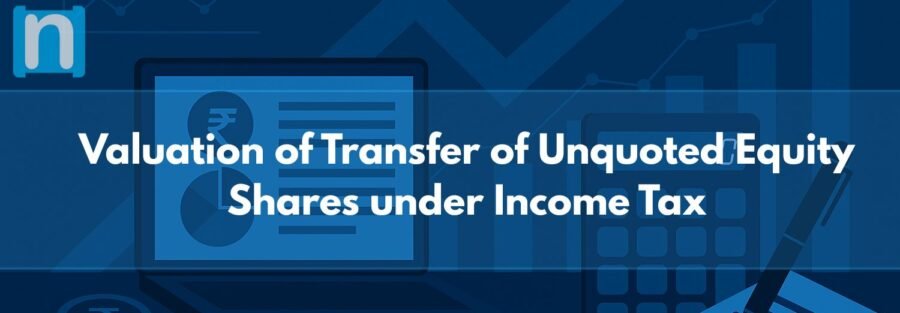Valuation of Transfer of Unquoted Equity Shares under Income Tax Act
Table of Contents
ToggleIn an era where corporate structuring and succession planning often involve the transfer or issue of equity shares, the valuation of unquoted equity shares under the Income Tax Act becomes a key compliance consideration. Unquoted shares – those not listed on any recognized stock exchange – pose unique challenges under Rule 11UA, especially for transactions involving private companies.
This article explains the valuation of transfer of unquoted equity shares under the Income Tax Act, the valuation of unquoted equity shares as per Rule 11UA, and the implications for both transfer and issue of shares.
Income Tax Provisions: Section 50CA & Section 56(2)(x) for Valuation of Unquoted Shares
To curb tax avoidance via undervaluation of unquoted shares, the Finance Act, 2017 introduced two key anti-abuse provisions:
Section 50CA – For Transferors:
Where the transfer value of unquoted equity shares is less than Fair Market Value (FMV), the FMV shall be deemed as the sale consideration for computing capital gains under Section 48.
Section 56(2)(x) – For Transferees:
If unquoted shares are received without consideration or for inadequate consideration, the difference between FMV and actual consideration is taxed as ‘Income from Other Sources’.
This leads to dual taxation – capital gain for the seller and deemed income for the buyer.
Valuation Methodology – Rule 11UA(1)(c)
The valuation of unquoted equity shares as per the Income Tax Act must follow the methodology prescribed under Rule 11UA(1)(c)(b) of the Income Tax Rules.
FMV = (A + B + C + D – L) × (PV / PE)
Where:
- A = Net tangible assets (excluding jewelry, immovable property, deferred revenue expenses, etc.)
- B = FMV of jewelry and artistic works (via registered valuer)
- C = FMV of securities
- D = Stamp duty value of immovable property
- L = Book value of liabilities (with specific exclusions)
- PV = Paid-up value of shares being transferred
- PE = Total paid-up equity capital
Valuation Date = Date of actual transfer.
Valuation must be certified by a Chartered Accountant or Registered Valuer as per prescribed standards.
The same Rule 11UA principles also apply to issue of shares under Rule 11UA, where valuation certification is required to determine FMV for capital gain and income tax compliance.
Consequence of Non-Compliance
| Party | Trigger | Taxability |
| Transferor | Sale below FMV (Sec 50CA) | Capital gains on FMV less cost |
| Transferee | Purchase below FMV (Sec 56(2)(x)) | Income from other sources |
Threshold Exemption: If the difference is ≤ ₹50,000, Section 56(2)(x) does not apply.
Role of Registered Valuer & Audit Trail
A Registered Valuer or Chartered Accountant plays a pivotal role in ensuring:
- Accurate FMV computation
- Justification of assumptions and methodologies
- Documentation trail for audit and scrutiny
- Compliance with Rule 11UA and valuation best practices
Maintaining a defensible audit trail is essential, especially in high-stake transactions involving group restructuring, buybacks, or ESOP liquidity events.
Common Mistakes & Risk Areas
- Ignoring valuation requirement for small transfers
- Using book value instead of FMV for tax computation
- Skipping valuation certification
- Overlooking dual taxation exposure
- Inadequate documentation for audit trail
- Relying solely on internal calculations without professional validation
Proactive planning and valuation certification mitigate audit risk and litigation exposure.
Frequently Asked Questions (FAQs)
1. Is valuation mandatory for all unquoted share transfers?
Yes, if the transfer is not at arm’s length or involves related parties.
2. Who can issue a valuation report?
A Registered Valuer under the Companies Act or a Chartered Accountant.
3. What is the holding period criteria for LTCG vs STCG?
- STCG: Held ≤ 24 months
- LTCG: Held > 24 months
4. Can indexation benefit be availed on LTCG for unquoted shares?
No, post 23rd July 2024, indexation is no longer available.
5. Are there exemptions from capital gains tax?
Yes, under Section 54F and Section 54EC, subject to conditions
How Our Firm Can Help You
At N Pahilwani and Associates, we combine valuation expertise with tax compliance advisory to offer end-to-end support for
- Fair Valuation Reports under Rule 11UA
- Registered Valuer Certification (IBBI-compliant)
- Income Tax Capital Gains Computation & Advisory
- Share Transfer Documentation & Audit Trail
- Transaction Structuring for ESOPs, Buybacks, M&A
Conclusion
The valuation of unquoted equity shares during transfer is not just a compliance formality – it’s a critical risk mitigation exercise. Non-adherence can trigger dual taxation, penalties, and scrutiny. Finance professionals must ensure compliance with Section 50CA, 56(2)(x) and Rule 11UA to protect stakeholder interests.
Engaging a professional firm ensures that your valuation stands scrutiny and aligns with regulatory expectations.



